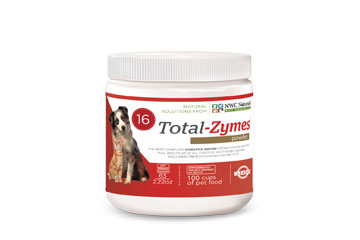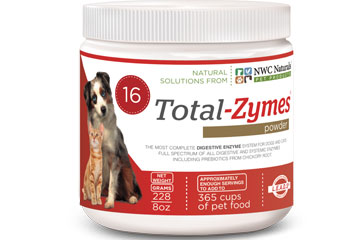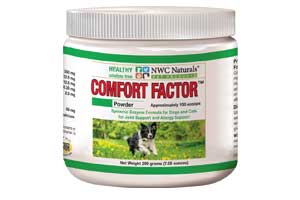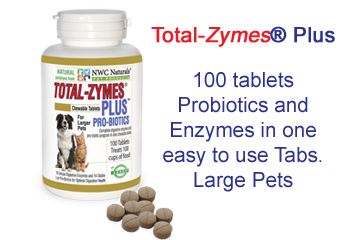Non animal sourced enzymes:
Derived from plants or selected microorganisms by the process of natural fermentation
•Active in a broad pH range (approximately 3.0 - 0.0)
•Activated in upper stomach and continues working through the entire digestive track
•Begin working immediately
•Broad action on a variety of foods for complete digestion
Modern Pet Food…
Are enzymes missing in processed dog and cat foods?
Modern food processing techniques and all types of cooking destroy nearly 100% of the enzymes naturally occurring in food. Enzymes are completely denatured when exposed to temperatures over 118 deg. for any length of time. The modern pet diet consisting of cooked and processed food is essentially devoid of active enzymes.
All raw food naturally contains the proper types and proportions of enzymes necessary to assist in the process of decomposition. In addition, when raw food is eaten, chewing ruptures the cell membranes and releases these indigenous food enzymes, many of which survive and contribute to the digestive process.
Plant or Animal Based Enzymes:
What is the difference between pancreatic enzymes, animal based enzymes and non-animal enzymes?
Total-Zymes® does NOT contain any animal based enzymes and here is why! Supplemental pancreatic, plant, and microbial enzymes are all designed to enhance digestion. However, plant and microbial enzymes use a "proactive" approach and begin working on foods sooner after ingestion. Pancreatic enzymes do not go to work right away. Pancreatic enzymes usually begin working approximately 30 minutes after food reaches the stomach. Because of their stability in the acidic environment of the upper stomach, plant and microbial enzymes can begin their digestive action immediately after the food reaches this region. With the increased exposure to digestive enzyme activity, food has a better chance of being broken down into small, more readily absorbed particles.
The pet digestive system
Should I add digestive enzymes when using probiotics?
It is always recommended to use enzymes with probiotics for a complete digestive solution. Enzymes will help your pets digestion and absorption of their food, no matter what you feed them. Animals are meant to eat a 100% raw diet, but is that practical. So adding enzymes with probiotics makes it a complete digestion solution.
Use a formula with at least 16 types of vegetarian enzymes and probiotics with 14 live active stable probiotics.
Studies have shown that over time, your pets body becomes less efficient at digesting food and maintaining high levels of probiotics in the intestines. With probiotics and enzymes you can jump start their immune system. Probiotics and enzymes togethe rmake a digestive machine.
Most food enzymes are essentially destroyed.
Most food enzymes are essentially destroyed under the conditions used to cook and process food, leaving foods devoid of enzyme activity. Placing the full digestive burden on your pets body, the body's digestive process can become over-stressed. Supplemental enzymes can support the level of digestion and help the level of nutrient absorption.
Is supplementation really necessary?
The primary purpose of enzymes in supplement form is to enhance the enzymes available in raw food, and replace those enzymes lost when food is cooked or processed. In addition, supplementation enables more digestion to begin in the gastric region, easing the burden on the digestive system as a whole. The earlier that digestion can begin, the greater the benefits.
Every pet can benefit from supplementation with enzymes. Even healthy pets can get support in absorption and utilization of nutrients through the use of digestive enzymes. Of course the benefits will vary, depending upon the dogs and cats diet and general health. Individuals in good health can expect to notice less fullness after meals, increased energy, faster emptying of the stomach contents, decreased gas,fewer hair balls and more regular bowel habits.
Why did my Vet get a false positive on my pets Test for pancreatitis?
This will happen if you are using a good quality enzyme product like Total-Zymes®. What happens is the enzymes are and should be circulating in the dogs system. The test then will simply pick them up and show up as a false positive. Because we use a formula that is highly effective the presence of these enzymes will show up. This is agood thing because the enzymes are systemically in the dogs body and are what supports healthy joints. Most vets know to ask if you are giving your pet enzymes. The best thing to do is to stop all enzymes five days beforethe test so you get a proper reading. You still can use the Probiotics as they do not effect the enzyme levels.
Not All Enzyme Products Are The Same
Probiotics and enzymes are becoming the new healthy trend in the people and PET industry. The truth is probiotics and enzymes are an essential supplement for all pets. However, it seems that a host of new probiotics for pets and enzyme supplements are coming on the market. Pet food companies are also attempting to add enzymes and probiotics to their food. Without proper packaging, handling and storage this is not very effective.
You want the best for your pet so make sure you are getting a product that is back by years of knowledge and expertise, not new companies trying to go with the trend.
Go with a company that started the trend. NWC Naturals Inc.
Human Grade: Yes because it is made in a human grade manufacturer you too can even taste it with the same confidence you have with our human products.
Total-Zymes® is THE ONLY pet enzyme formula that has 16 digestive enzymes with Pre-Biotics and a delivery system. Many others brands just do not have what Total-Zymes® has, a unique delivery system. Without this L.E.A.D.S.® Delivery System the enzymes would deplete your pet of much needed minerals and it would not delivery quickly and not be as efficient. All enzymes need minerals to do their job. NWC Naturals® are the experts and are the only company that uses this unique blend of minerals in their delivery system to support your pet’s body. That is why ours works. Since 2003.
Any information provided is not veterinary advice and should not be substituted for a regular consultation with a veterinary professional. If you have any concerns about your pet's health, contact your veterinarian's office.




